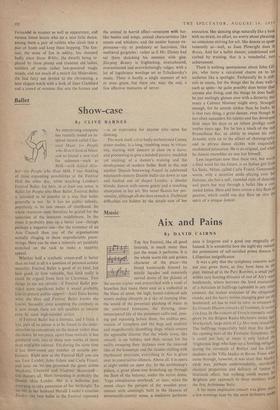Ballet
Show-case
By CLIVE BARNES AN enterprising company has recently issued an in- spired record called Clas- sical Music' for People who Kate C'hissit.al Music and so blazed a new trail for salesmen—such as Milk—with Added Alco- hol—for People who Hate Milk. I was thinking of these • expanding possibilities at the Festival Hall the other day, while watching London's Festival Ballet, for here, in at least one sense, is Ballet for People, who Hate Ballet. Festival. Ballet is intended to be popular in a way that ballet generally is not. • As it has no public subsidy, popularity is its one means of livelihood. Its whole resources must therefore be geared for the seduction of the innocent middlebrow. In the event it probably puts up a better case-7though perhaps a negative one--for the existence of an Arts Council than any of the organisations actually clinging to those unpredictable purse- strings. Here can be seen a minority art painfully stretched on the rack to make a majority appeal.
Whether half a synthetic cream-puff is better than no loaf at all is a question of personal artistic morality. Festival Ballet is good of its kind, but hOw gbOd, or how valuable, that kind really is could be argued from here to Christmas. Two things to me are certain : if Festival Ballet pro- vided more significant ballet it would probably lose its present public support---Aunt Edna knows what she likes and Festival Ballet knows she knows. Secondly, even accepting the cOmpany as it now stands there are still qualities to interest even its most high-minded critics.
11 Festival Ballet has a formula, and I think it has, part of its power is to be found in the deter- mination to concentrate on the dancer rather than the dance. In ten years, apart from revivals, it has produced only two or three new works of more than negligible interest. Yet during the same time it has show-cased any number of notable per- formers. Right now at the Festival Hall you can see Toni Lander, John Gilpin and Carla Fracci, and later on we are promised the guest artists Markova, Chauvird and Vladimir Skouratoff- fine dancers all. Most rewarding is probably the Danish Miss Lander. She is a ballerina just emerging to take possession of her birthright. To see her in her husband Harald Lander's creation Eludes--the best ballet in the Festival repertory —is an experience for anyone who cares for dancing.
The work itself, set to badly orchestrated Czerny piano studies, is a long, rambling essay in virtuo- sity, starting with dancers at class on a barre, and proceeding to give a nutshell picture, muddled yet exciting, of a dancer's training and the development of modern ballet. Both in this and ' another Danish borrowing Napoli (a celebrated nineteenth-century Danish ballet cut down to size and hacked out of shape) Lander, a slender blonde, dances with serene gaiety and a touching absorption in her art. She never flaunts her per- sonality, although all she does reveals it. Technical difficulties are hidden by the simple ease of her execution. Her dancing sings naturally like a bird, with no strain, no effort, no worry about phrasing, no conscious striving for art. She dances as spon- taneously as—well, as Joan Plowright does in Roots. And for a ballet dancer, conditioned and curbed by training, that is a wonderful, fare achievement.
There is nothing spontaneous about John Gil' pin, who turns a calculated charm on to his audience like a spotlight. Technically he is diffi' cult to assess, for the things that he does well—' such as spins—he quite possibly does better than anyone else living, and the things he does badly he just smilingly glosses over with a dexterity that many a Cabinet Minister might envy. Strangely enough, for he sounds slicker than he looks, he is that rare thing, a great dancer, even though he too often squanders his talents and has developed little since his days as an infant prodigy some twelve years ago. Yet he has a touch of the real Promethean fire, an ability to impose his own dynamic style on to the silliest of choreography, and to phrase dance clichés with exquisitelY modulated intonation. He is an original, and when he dances resembles no one but himself.
Less important now than these two, but worth a final word for the future, is an Italian girl from La Scala, Milan, called Carla Fracci. GenerouslY warm, with a secretive smile playing over her features, she has a soft, rounded style of dancing, and purrs her way through a ballet like a con' tented kitten. Here and there comes a tiny flash of passion, which could one day flare up into the spirit of a unique dancer. .


































 Previous page
Previous page